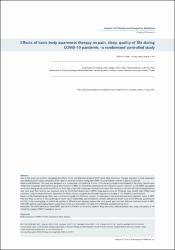| dc.contributor.author | Kutlutürk Yıkılmaz, Seval | |
| dc.contributor.author | Güloğlu, Selen | |
| dc.contributor.author | Özek, Öznur | |
| dc.contributor.author | Demirtaş, Melisa | |
| dc.contributor.author | Aras, Gizem Nur | |
| dc.date.accessioned | 2023-05-15T08:54:13Z | |
| dc.date.available | 2023-05-15T08:54:13Z | |
| dc.date.issued | 2023 | en_US |
| dc.identifier.citation | Kutlutürk Yıkılmaz, S., Güloğlu, S., Özek, Ö., Demirtaş, M. ve Aras, G. N. (2023). Effects of basic body awareness therapy on pain, sleep, quality of life during COVID-19 pandemic -a randomized controlled study. Annals of Clinical and Analytical Medicine, 14(1), 65-69. https://doi.org/10.4328/ACAM.21435 | en_US |
| dc.identifier.issn | 2667-663X | |
| dc.identifier.uri | https://doi.org/10.4328/ACAM.21435 | |
| dc.identifier.uri | https://hdl.handle.net/20.500.12511/10942 | |
| dc.description.abstract | Aim: In this study, we aimed to investigate the effects of the telerehabilitation-based BBAT (Basic Body Awareness Therapy) approach on body awareness, musculoskeletal pain, sleep, and quality of life (QoL) in university students during the COVID-19 social isolation and home quarantine period. Material and Methods: The study was designed as a randomized controlled trial. A total of 40 university students participated in the study. Patients were divided into two groups: the treatment group who received the BBAT (n=20) and the control group who refused to receive treatment (n=20). BBAT was applied to the treatment group on an online platform for three days a week (60 minutes per session) for six weeks. Pre-and post-treatment self-reported questionnaire data were used. Pain severity was assessed using the McGill Pain Questionnaire (MPQ), sleep quality using the Pittsburg Sleep Quality Index (PSQI), body awareness using the Body Awareness Questionnaire (BAQ), and QoL using the World Health Organization Quality of Life (WHOQoL) questionnaire. Results: In the treatment group, there was a statistically significant difference between the participants' pre-treatment and post-treatment scores in MPQ, PSQI and BAQ, as well as in the psychological health, social relationships and environment domains and general health facet of the WHOQoL questionnaire (p<0.05). In the control group, no statistically significant difference was observed between the participants' pre-treatment and post-treatment scores in MPQ, PSQI, BAQ and the psychological health, social relationships and environment domains of the WHOQoL questionnaire (p>0.05). Discussion: The telerehabilitation-based BBAT approach is effective for university students' body awareness, musculoskeletal pain, sleep, and quality of life during the ongoing COVID-19 pandemic period. | en_US |
| dc.description.sponsorship | Turkish Scientific and Technological Research Institution (TSTRI) | en_US |
| dc.language.iso | eng | en_US |
| dc.publisher | Bayrakol Medical Publisher | en_US |
| dc.rights | info:eu-repo/semantics/openAccess | en_US |
| dc.subject | Body Awareness | en_US |
| dc.subject | COVID-19 | en_US |
| dc.subject | Pain Pandemic | en_US |
| dc.subject | Sleep Quality | en_US |
| dc.title | Effects of basic body awareness therapy on pain, sleep, quality of life during COVID-19 pandemic -a randomized controlled study | en_US |
| dc.type | article | en_US |
| dc.relation.ispartof | Annals of Clinical and Analytical Medicine | en_US |
| dc.department | İstanbul Medipol Üniversitesi, Sağlık Bilimleri Fakültesi, Fizyoterapi ve Rehabilitasyon Bölümü | en_US |
| dc.authorid | 0000-0001-9120-7071 | en_US |
| dc.identifier.volume | 14 | en_US |
| dc.identifier.issue | 1 | en_US |
| dc.identifier.startpage | 65 | en_US |
| dc.identifier.endpage | 69 | en_US |
| dc.relation.publicationcategory | Makale - Uluslararası Hakemli Dergi - Kurum Öğretim Elemanı | en_US |
| dc.identifier.doi | 10.4328/ACAM.21435 | en_US |
| dc.institutionauthor | Kutlutürk Yıkılmaz, Seval | |
| dc.institutionauthor | Güloğlu, Selen | |
| dc.institutionauthor | Özek, Öznur | |
| dc.institutionauthor | Demirtaş, Melisa | |
| dc.institutionauthor | Aras, Gizem Nur | |
| dc.identifier.wos | 000964339100014 | en_US |


















